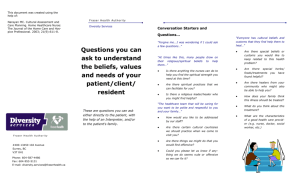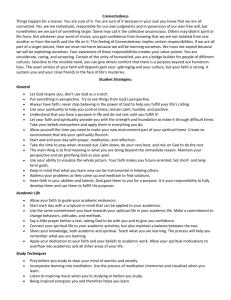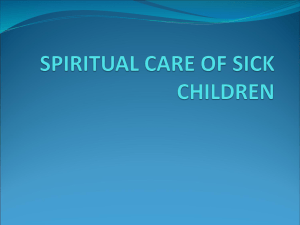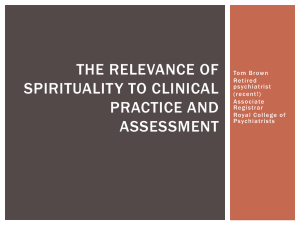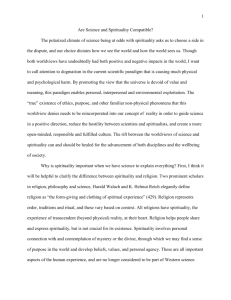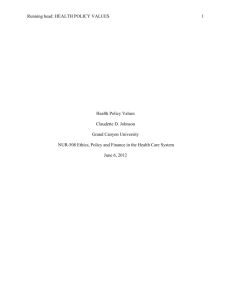Critical Elements of the Formulation/Spirituality
advertisement
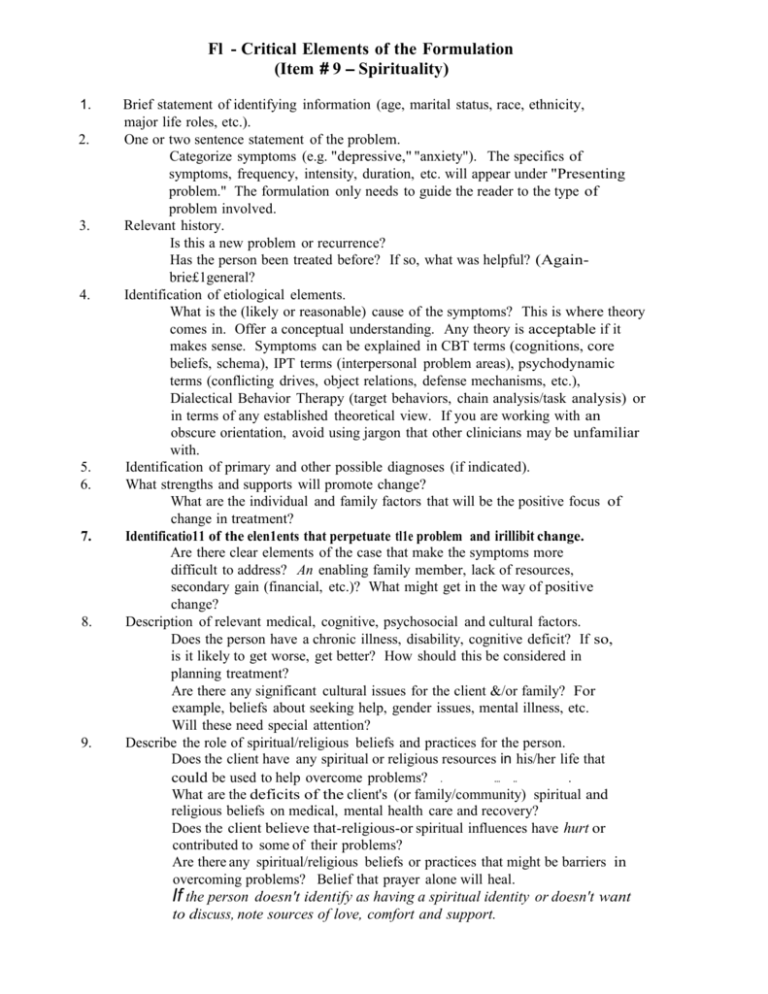
Fl - Critical Elements of the Formulation (Item # 9 - Spirituality) 1. 2. 3. 4. 5. 6. 7. 8. 9. Brief statement of identifying information (age, marital status, race, ethnicity, major life roles, etc.). One or two sentence statement of the problem. Categorize symptoms (e.g. "depressive," "anxiety"). The specifics of symptoms, frequency, intensity, duration, etc. will appear under "Presenting problem." The formulation only needs to guide the reader to the type of problem involved. Relevant history. Is this a new problem or recurrence? Has the person been treated before? If so, what was helpful? (Againbrie£1general? Identification of etiological elements. What is the (likely or reasonable) cause of the symptoms? This is where theory comes in. Offer a conceptual understanding. Any theory is acceptable if it makes sense. Symptoms can be explained in CBT terms (cognitions, core beliefs, schema), IPT terms (interpersonal problem areas), psychodynamic terms (conflicting drives, object relations, defense mechanisms, etc.), Dialectical Behavior Therapy (target behaviors, chain analysis/task analysis) or in terms of any established theoretical view. If you are working with an obscure orientation, avoid using jargon that other clinicians may be unfamiliar with. Identification of primary and other possible diagnoses (if indicated). What strengths and supports will promote change? What are the individual and family factors that will be the positive focus of change in treatment? Identificatio11 of the elen1ents that perpetuate tl1e problem and irillibit change. Are there clear elements of the case that make the symptoms more difficult to address? An enabling family member, lack of resources, secondary gain (financial, etc.)? What might get in the way of positive change? Description of relevant medical, cognitive, psychosocial and cultural factors. Does the person have a chronic illness, disability, cognitive deficit? If so, is it likely to get worse, get better? How should this be considered in planning treatment? Are there any significant cultural issues for the client &/or family? For example, beliefs about seeking help, gender issues, mental illness, etc. Will these need special attention? Describe the role of spiritual/religious beliefs and practices for the person. Does the client have any spiritual or religious resources in his/her life that could be used to help overcome problems? . ... .. . What are the deficits of the client's (or family/community) spiritual and religious beliefs on medical, mental health care and recovery? Does the client believe that-religious-or spiritual influences have hurt or contributed to some of their problems? Are there any spiritual/religious beliefs or practices that might be barriers in overcoming problems? Belief that prayer alone will heal. If the person doesn't identify as having a spiritual identity or doesn't want to discuss, note sources of love, comfort and support. 10. 11. How should spirituality be considered in the context of diagnosis and treatment? If the client is substance involved, do they see spirituality as a resource or a barrier to recovery? Identification of which problem(s) will be the focus of change in therapy. Is the primary emphasis for positive change going to be on patient behavior? If so, what behavior? (Be general here - save the specifics for the treatment plan. Are significant environmental changes necessary? For example, is the person's living situation conducive to positive change or can it be improved? Prognostic statement which includes the influence of the patient's insight and understanding. What are realistic expectations for the patient? Consider the patient's appropriateness for the chosen therapy, motivation, severity. Is this an episode of depression that will likely pass, or is it a chronic personality disorder indicating a focus on coping and management more than on cure Formulation Examples (2 examples for spirituality as part of formulation) Example 1: This is a 56 year old, divorced, Caucasian male, a recently retired engineer and a father of two adult children. He reported no psychiatric history. The patient complains of depressive symptoms, which began one month ago, shortly after he retired from an executive-level position. His symptoms have affected his relationships with his partner and his adult children, as he has become withdrawn and less active. He appears to have core beliefs about what makes a "good" person, and these include hard work and productivity. He has also developed core beliefs about himself as a leader. He sees himself as "hopeless" if he is without a clear position of authority and responsibility. Retirement has removed him from the roles that satisfied these needs and resulted in an adjustment disorder. He has frequent contact with friends who are still working and this emphasizes his change in status. A course of CBT is indicated to help him more clearly identify the beliefs (primarily about himself and his future), that are not serving him well in retirement, modify them where possible, and encourage changes he can make to satisfy his needs for productivity and leadership within the context of retirement. Given his intelligence, motivation for therapy, and lack of psychiatric history, his prognosis is good. Example 2: JT is a 10 year-old African American male who resides with his mother and his 5 year-old half sibling in Newark, NJ and presents with an essentially life long history of hyperactive, inattentive, distractible, and impulsive behavior and a more recent several year history of increasingly severe noncompliant, oppositional, intolerant and episodically aggressive behavior. JT has been in special educational programming for two years targeting his learning problems. JT's parents separated after his birth and he has had minimal contact with his father. His father has a history of antisocial behavior and there is a history of hyperactivity and learning problems on the maternal side of his family. JT's problems are consistent in part with a neurobiologically based Attention Deficit Hyperactivity Disorder and in part are a response to his difficult early childhood family life experience and to his learning frustrations in school. Associated diagnoses include an Oppositional Defiant Disorder and a Learning Disorder, NOS. There is no clinical evidence to support an Affective Disorder at this time. JT will benefit from continuing special educational programming targeting his academic and behavioral problems. JT and his family will benefit from the initiation of treatment in outpatient individual and family therapy with a behavioral modification and cognitive behavioral focus including behavioral parent training, and also anger management training. Treatment with psychostimulant medication targeting his hyperactive, impulsive and aggressive behaviors is also indicated. JT and his mother understand the goals of treatment and are presently motivated for treatment. The prognosis is fair to good contingent upon active involvement in treatment and continued special education.

